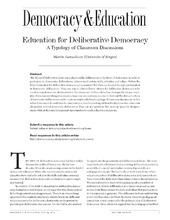| dc.contributor.author | Samuelsson, Martin | |
| dc.date.accessioned | 2019-06-28T08:48:06Z | |
| dc.date.available | 2019-06-28T08:48:06Z | |
| dc.date.issued | 2016 | |
| dc.identifier.issn | 1085-3545 | |
| dc.identifier.uri | https://hdl.handle.net/1956/20508 | |
| dc.description.abstract | The theory of deliberative democracy places public deliberations at the heart of democracy. In order to participate in democratic deliberations, citizens need certain skills, attitudes, and values. Within the field of education for deliberative democracy, it is assumed that these are learned through participation in democratic deliberation. Thus, one way to educate future citizens for deliberative democracy is by constructing democratic deliberations in the classroom. In this article, four strategically chosen examples of discussions taking place inside classrooms are analyzed, in order to flesh out the abstract criteria of democratic deliberations and to create an empirically based typology of classroom discussions. In this article I also aspire to contribute to classroom practices by pointing out how teachers can steer classroom discussions toward democratic deliberation: They can use questions that open up space for disagreement, while at the same time present opportunities to reach collective conclusions. | en_US |
| dc.language.iso | eng | eng |
| dc.publisher | Lewis & Clark Graduate School of Education and Counseling | eng |
| dc.relation.ispartof | <a href="http://hdl.handle.net/1956/20510" target="blank"> Education for Deliberative Democracy. Theoretical assumptions and classroom practices</a> | |
| dc.title | Education for Deliberative Democracy: A Typology of Classroom Discussions | eng |
| dc.type | Peer reviewed | |
| dc.type | Journal article | |
| dc.description.version | publishedVersion | |
| dc.rights.holder | Copyright Democracy and Education | eng |
| dc.source.articlenumber | 5 | |
| dc.identifier.cristin | 1354087 | |
| dc.source.journal | Democracy and Education | |
| dc.source.40 | 24 | |
| dc.source.14 | 1 | |
